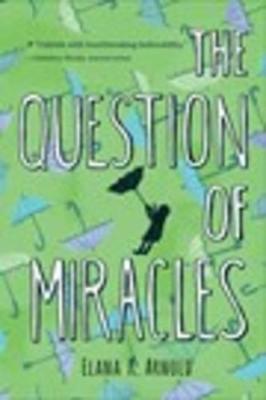Reviewed by Briana @ Pages Unbound on
Review: Following the journey of sixth grader Iris as she learns to deal with the aftermath of her best friend's unexpected death, The Question of Miracles is a thoughtful book that asks hard-hitting question about who gets miracles and why. As Iris searches for answers, she stumbles across a number of different belief systems and their followers, ranging from a local psychic who claims to communicate with the dead to officials from the Vatican. Although the novel is ultimately dismissive of every option Iris investigates, it is refreshingly open-minded during the process of searching itself and encourages readers to be active participants in their own belief-formation.
Iris, perhaps due to being a single child or perhaps due to having experienced the death of a friend so young, occasionally sounds older than her middle grade age in her thoughts and dialogue. Interestingly, the adults in the story often seem to overlook her maturity, instead focusing on how she is handling her friend's death and worrying about all the things adults do: whether she's too depressed, whether she is making enough friends in her new school, whether she'll ever come to terms with the relocation. Arnold balances these concerns and Iris's reactions quite nicely; Iris exhibits the sass and frustration one might expect from a child who's all too aware her parents think she's reacting "incorrectly," without ever coming across as overly annoying or rude.
Her friend Boris provides a nice contrast in personality. He's not used to having friends and is too interested in playing Magic to be considered cool. However, even though Arnold devotes a lot of time to carefully building their friendship, the constructive mechanics behind it are sometimes a little too obvious. After some initial reluctance, Iris essentially decides they WILL be friends because she might as well be friends with someone. Real friendship "chemistry" between the two of them is sometimes lacking.
However, the novel's biggest flaw is the abrupt ending. The final chapter itself actually does tie up most of the loose ends nicely; the real problem is the lack of lead-up to this chapter. There is no progression to the concluding thought and feelings. At one moment, the story is going along as it always has been, at the same pace, with the same open questions about miracles and religion and life. The next moment, Iris has apparently has most of her questions solved, at least to the point of being satisfied with her life as it stands. What leads her to this satisfaction? There is really no indication. Personally, I feel as if I have been gypped out of several chapters that would explain this to me.
The Question of Miracles is certainly an ambitious book, one willing to ask children to consider troublesome questions about death and the fairness of life. Unfortunately, a thought-provoking story and unique middle grade characters are somewhat overshadowed by the feeling that a sizable chunk of the story is completely missing. Give me three more chapters and I'll consider joining the conversations about giving The Questions of Miracles literature awards.
Source: I received a copy of the book from the publisher via a Goodreads giveaway.
Reading updates
- Started reading
- 16 February, 2015: Finished reading
- 16 February, 2015: Reviewed
